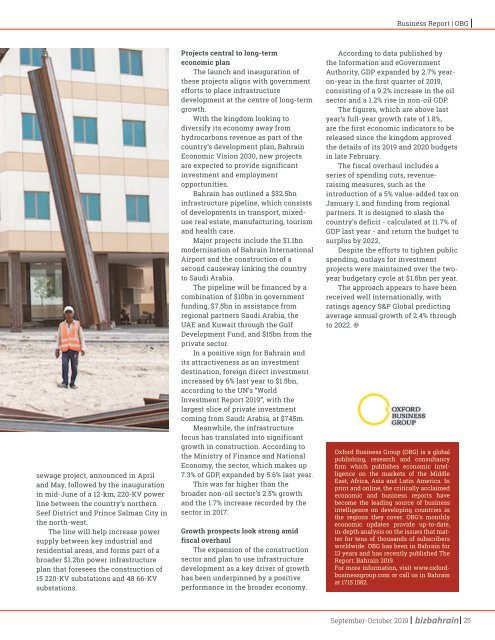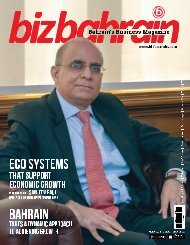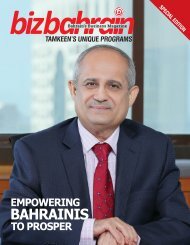BizBahrain Magazine Sep-Oct 2019_compressed
You also want an ePaper? Increase the reach of your titles
YUMPU automatically turns print PDFs into web optimized ePapers that Google loves.
Business Report | OBG<br />
sewage project, announced in April<br />
and May, followed by the inauguration<br />
in mid-June of a 12-km, 220-KV power<br />
line between the country’s northern<br />
Seef District and Prince Salman City in<br />
the north-west.<br />
The line will help increase power<br />
supply between key industrial and<br />
residential areas, and forms part of a<br />
broader $1.2bn power infrastructure<br />
plan that foresees the construction of<br />
15 220-KV substations and 48 66-KV<br />
substations.<br />
Projects central to long-term<br />
economic plan<br />
The launch and inauguration of<br />
these projects aligns with government<br />
efforts to place infrastructure<br />
development at the centre of long-term<br />
growth.<br />
With the kingdom looking to<br />
diversify its economy away from<br />
hydrocarbons revenue as part of the<br />
country’s development plan, Bahrain<br />
Economic Vision 2030, new projects<br />
are expected to provide significant<br />
investment and employment<br />
opportunities.<br />
Bahrain has outlined a $32.5bn<br />
infrastructure pipeline, which consists<br />
of developments in transport, mixeduse<br />
real estate, manufacturing, tourism<br />
and health care.<br />
Major projects include the $1.1bn<br />
modernisation of Bahrain International<br />
Airport and the construction of a<br />
second causeway linking the country<br />
to Saudi Arabia.<br />
The pipeline will be financed by a<br />
combination of $10bn in government<br />
funding, $7.5bn in assistance from<br />
regional partners Saudi Arabia, the<br />
UAE and Kuwait through the Gulf<br />
Development Fund, and $15bn from the<br />
private sector.<br />
In a positive sign for Bahrain and<br />
its attractiveness as an investment<br />
destination, foreign direct investment<br />
increased by 6% last year to $1.5bn,<br />
according to the UN’s “World<br />
Investment Report <strong>2019</strong>”, with the<br />
largest slice of private investment<br />
coming from Saudi Arabia, at $745m.<br />
Meanwhile, the infrastructure<br />
focus has translated into significant<br />
growth in construction. According to<br />
the Ministry of Finance and National<br />
Economy, the sector, which makes up<br />
7.3% of GDP, expanded by 5.6% last year.<br />
This was far higher than the<br />
broader non-oil sector’s 2.5% growth<br />
and the 1.7% increase recorded by the<br />
sector in 2017.<br />
Growth prospects look strong amid<br />
fiscal overhaul<br />
The expansion of the construction<br />
sector and plan to use infrastructure<br />
development as a key driver of growth<br />
has been underpinned by a positive<br />
performance in the broader economy.<br />
According to data published by<br />
the Information and eGovernment<br />
Authority, GDP expanded by 2.7% yearon-year<br />
in the first quarter of <strong>2019</strong>,<br />
consisting of a 9.2% increase in the oil<br />
sector and a 1.2% rise in non-oil GDP.<br />
The figures, which are above last<br />
year’s full-year growth rate of 1.8%,<br />
are the first economic indicators to be<br />
released since the kingdom approved<br />
the details of its <strong>2019</strong> and 2020 budgets<br />
in late February.<br />
The fiscal overhaul includes a<br />
series of spending cuts, revenueraising<br />
measures, such as the<br />
introduction of a 5% value-added tax on<br />
January 1, and funding from regional<br />
partners. It is designed to slash the<br />
country’s deficit - calculated at 11.7% of<br />
GDP last year - and return the budget to<br />
surplus by 2022.<br />
Despite the efforts to tighten public<br />
spending, outlays for investment<br />
projects were maintained over the twoyear<br />
budgetary cycle at $1.8bn per year.<br />
The approach appears to have been<br />
received well internationally, with<br />
ratings agency S&P Global predicting<br />
average annual growth of 2.4% through<br />
to 2022.<br />
Oxford Business Group (OBG) is a global<br />
publishing, research and consultancy<br />
firm which publishes economic intelligence<br />
on the markets of the Middle<br />
East, Africa, Asia and Latin America. In<br />
print and online, the critically acclaimed<br />
economic and business reports have<br />
become the leading source of business<br />
intelligence on developing countries in<br />
the regions they cover. OBG's monthly<br />
economic updates provide up-to-date,<br />
in-depth analysis on the issues that matter<br />
for tens of thousands of subscribers<br />
worldwide. OBG has been in Bahrain for<br />
13 years and has recently published The<br />
Report: Bahrain <strong>2019</strong>.<br />
For more information, visit www.oxfordbusinessgroup.com<br />
or call us in Bahrain<br />
at 1715 1582.<br />
<strong>Sep</strong>tember-<strong>Oct</strong>ober <strong>2019</strong><br />
25
















